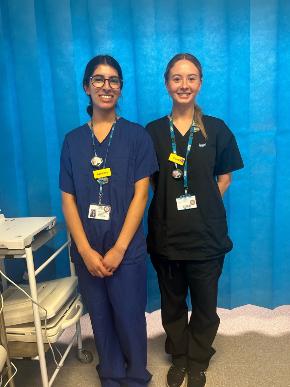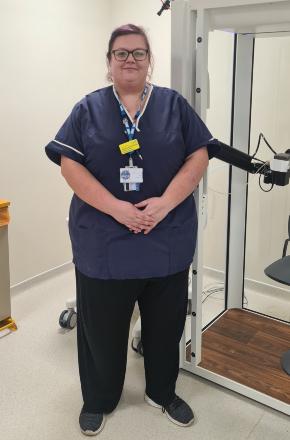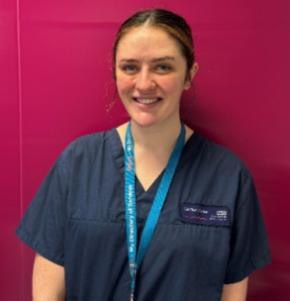You are here
Healthcare Science - focus on apprenticeships
6 February 2024
National Apprenticeship Week takes place from 5 to 11 February celebrating the value, benefit, and opportunity that apprenticeships bring.
The NHS is the nation’s biggest trainer of apprentices. Since 2017 over 100,000 NHS apprenticeships have been completed. Retention figures show 90% of apprentices stay in the NHS.
The NHS Long Term Workforce Plan sets our ambition for 22 percent of all NHS clinical staff to be trained via an apprenticeship.
Below we hear from healthcare science apprentices across the region to understand their roles and how they are making a difference for patients.
 Karishma Patel
Karishma Patel
Level 6 Apprentice in Cardiac Science
Mid and South Essex NHS Foundation Trust
Describe a day in the life of your role?
I work as part of a team and see patients on a daily basis. We specialise in performing diagnostic tests which we use to routinely follow up patients. We do this using ECGs, exercise tolerance tests, pacemaker follow up clinics, and ambulatory analysis
What do you enjoy most about your role?
I enjoy working in a patient facing role whilst using my scientific skillset to perform diagnostic test. In this way I can have enjoyable conversations with patients knowing I am a part of the team that is caring for them.
What was your career path to the position you are in now?
I have previously completed a degree in neuroscience and was looking for an interesting job in healthcare. I came across this role and enjoyed the idea of studying towards another degree and whilst applying my new knowledge to the job.
What is your biggest achievement to date?
I have built a close relationship with doctors at the hospital which has meant I have been able to take on additional responsibilities. I am in the process of conducting a clinical audit with the hope of publishing a scientific abstract.
Claudia Mair
Apprentice Cardiac Physiologist
Mid and South Essex NHS Foundation Trust
About your role?
I go to university twice a week and work in the hospital three days. I perform a variety of diagnostic investigations including 12 lead ECGs (electrocardiogram - a test that records the electrical activity of the heart) and cardiac monitors. With supervision, I am also able to perform exercise testing, ambulatory analysis, pacemaker checks and get exposure to our labs where they insert pacemakers and perform angiograms (a type of X-ray used to check blood vessels).
What was your career path to the position you are in now?
I studied sports therapy at university which included a physiology module. I found it really interesting but I never dreamt this would be my current job! After university I started a job in cardiac rehab as a healthcare assistant (HCA) and this is where my love for cardiology started.
A friend had completed the NHS apprenticeship scheme and highly recommended it. I looked online where I saw the Cardiac Physiologist opportunity. Through this job, I get on-the-job experience which was highly important to me and has definitely helped my progress, and complete a second degree.
What do you enjoy most about your role?
I enjoy feeling a part of a team and having the opportunity to ask questions. This helps develop my learning and makes me feel ready for when I qualify. I help provide patient-centred care to help find out why they are unwell and help lead them in the correct treatment. I also enjoy being able to apply some of my knowledge from university straight into the job.
What is your biggest achievement to date?
Along with my colleague I’m completing an audit into the implantable loop recorder (a small implanted device that records heart electrical activity) service at my hospital. I feel honoured to have been given this responsibility and have a long-term goal of writing a scientific abstract with the data collected.
 Lauren-Jayne Randall
Lauren-Jayne Randall
Level 4 CardioRespiratory
North West Anglia NHS Foundation Trust
Describe a day in the life of your role?
Each day is very different. I could be non-clinical attending tutored lessons, reviews and completing my assignments. Or I could be working clinically within the Respiratory Investigations Department performing lung function checks or other diagnostic tests and interpreting the results.
What do you enjoy most about your role?
My role can be so varied encompassing both respiratory and cardiac diagnostics allowing me to take my knowledge across from one practice to another. Patient contact is important to me and so I enjoy having the ability to learn while keeping this contact.
What was your career path to the position you are in now?
I started my career within the NHS as a school leaver, doing my A-levels as a nursing cadet. I then spent time as a senior health care assistant working closely with high dependency respiratory patients, this is where my passion for respiratory started. I moved into emergency medicine but missed working with respiratory patients so moved to Respiratory Investigations where I have developed my knowledge of healthcare sciences. It was here that an opportunity for the apprenticeship arose.
What is your biggest achievement to date?
I presented an abstract at a major conference evaluating the drive-thru breathing assessment the department had developed during the COVID-19 pandemic. I also evaluated patient education, compliance and understanding surrounding inhalers to help reduce the carbon footprint that inhalers have. This included creating and presenting the 'Lets speak about technique' day in which I educated patients on the correct technique of their prescribed inhalers.
 Layla Cooke
Layla Cooke
Level 6 Cardiac Science
West Suffolk Hospital
Describe a day in the life of your role?
I carry out cardiac diagnostics, including performing a range of cardiac tests and analysing results. I also work as 2nd person in ETT’s (exercise tolerance tests). We work closely with other areas including the cardiac ward, paediatric departments and nuclear medicine when performing different diagnostic tests.
What do you enjoy most about your role?
I enjoy being patient focused, providing care in an outpatient setting for a wide variety of patients. I feel very passionate about delivering compassionate and empathetic care, ensuring I’m making patients feel comfortable. I really enjoy working with the paediatric departments, being able to build a rapport with children and their parents, helping educate and involve them in the process to take away any anxiousness or uncertainty.
I also enjoy working as part of a team, as we have a range of different levels of physiologists and scientists within our department. Our department is very encouraging of progression and development within your role, and we’re very lucky to have supportive colleagues – everyone is approachable and happy to share their experiences and knowledge.
What was your career path to the position you are in now?
I started my career in the NHS at Ipswich hospital before completing an apprenticeship with the East of England Ambulance Service, qualifying as an Emergency Medical Technician. I knew I wanted to specialise in cardiology, so further applied for a Healthcare Science Assistant role at West Suffolk Hospital where I’ve been working since July 2022. They’ve supported me and my development within my role, starting my degree apprenticeship in Healthcare Science last year.
What is your biggest work achievement?
Completing my respiratory placement at Royal Papworth Hospital, learning spirometry (a common type of breathing test), a skill I had no previous experience in, and achieving firsts for my university work which I didn’t feel I would be able to do!